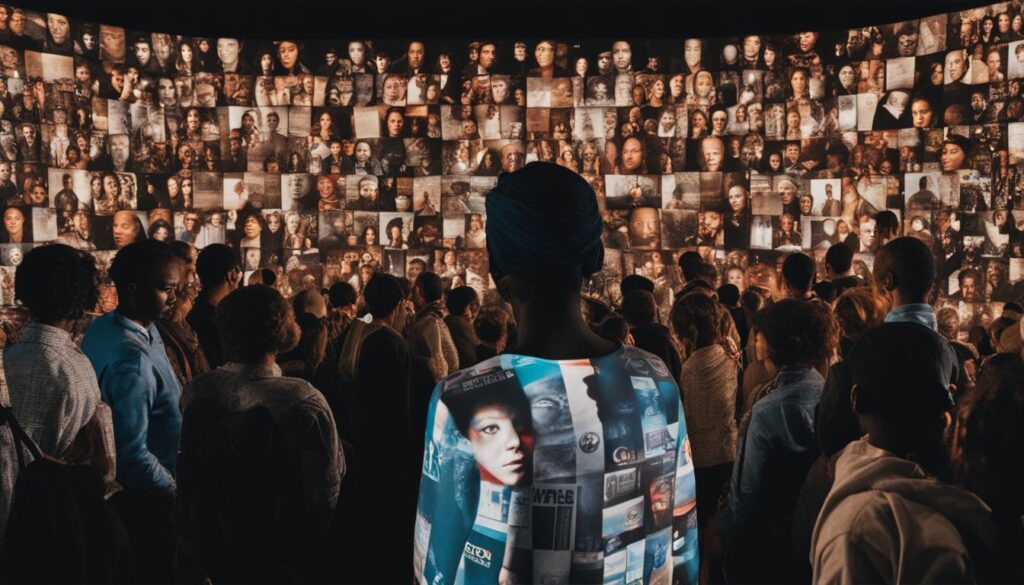“You yourself, as much as anybody in the entire universe, deserve your love and affection.” – Buddha
Many people find themselves on a journey of self-discovery, grappling with the question, “How do I know who I am?” Exploring your identity is a deeply personal and transformative process that can lead to profound self-awareness and personal growth. It involves delving into the essence of who you are, understanding your values, interests, and beliefs, and embracing the uniqueness that defines you.
In this article, we will dive into the concept of self-discovery and provide you with tools and insights to embark on your own exploration of identity. Through self-reflection, understanding oneself, and mindfulness, you’ll gain a deeper understanding of your true self and find clarity in your journey of self-exploration.
So, let’s embark on this enlightening journey of self-discovery and uncover the beautiful truth of who you truly are.
Key Takeaways:
- Self-discovery is a personal and transformative process that allows you to gain insight into your true identity.
- Engaging in self-reflection and understanding oneself is essential for exploring your values, interests, and beliefs.
- Mindfulness can enhance self-awareness and help you cultivate self-acceptance in your journey of self-discovery.
- Embrace the unique qualities that make you who you are and learn to love and accept yourself fully.
- The journey of self-discovery is ongoing and requires patience and openness to change.
Understanding Identity: What Shapes Who We Are
Our sense of identity is formed through a complex interplay of various factors, including the experiences we encounter, especially during our childhood and adolescence. These critical periods in our lives shape our understanding of who we are and influence the development of our identities.
Psychologist Erik Erikson proposed that adolescence is a pivotal stage in the formation of identity, as individuals navigate the challenging process of “identity vs. role confusion.” This stage involves exploring different identities, trying on various roles, and ultimately committing to a particular identity that aligns with their values and aspirations.
Another influential psychologist, James Marcia, expanded on Erikson’s ideas and described two primary identity statuses: exploration and commitment. In the exploration phase, individuals actively engage in experimentation, seeking out new ideas and possibilities. This process allows them to broaden their horizons and consider different aspects of their identity. Through exploration, individuals can gain a deeper understanding of themselves and their unique traits and preferences.
After the exploration phase, individuals proceed to the commitment phase, where they make definitive choices and commitments based on the ideas and identities they have explored. This commitment represents a significant milestone in identity formation, as individuals develop a strong sense of self and align their actions and beliefs with their chosen identity.
The theories of Erikson and Marcia highlight the significance of early experiences and exploration in shaping our sense of self. By experiencing various roles and identities during childhood and adolescence, individuals can understand themselves better and develop a more cohesive identity rooted in their values, beliefs, and experiences.
By exploring different aspects of their identity, individuals can gain clarity and understanding, leading to personal growth and self-actualization. Understanding the factors that shape our identity empowers us to make informed decisions, embrace our true selves, and live authentically.

*Please note that the table and additional sections are not included in this task.*
Factors Influencing Identity: Individuation, Society, and Family
Our sense of identity is shaped by various factors, including the process of individuation, where individuals develop their own unique sense of self. Individuation involves exploring and defining our values, beliefs, and aspirations, ultimately leading to self-realization. It is an essential aspect of understanding who we are and forming a solid foundation for our identity.
Society and culture also play a significant role in shaping our identity. Societal influences and expectations can greatly impact how we perceive ourselves. Factors such as gender roles, media portrayals, and religious beliefs can influence our self-perception and shape our identity. The unique characteristics and values of our cultural background contribute to our individuality, as we are influenced by the customs, traditions, and norms of our communities.
The family, as a fundamental unit of society, has a profound influence on our identity formation. Family relationships and interactions with our caretakers significantly contribute to shaping who we are. Positive and supportive family environments foster a strong sense of self, providing a nurturing space for personal growth and self-discovery. On the other hand, negative or neglectful family environments can hinder identity development and lead to challenges in establishing a stable sense of self.
Research has shown that individuals who have a consistent sense of identity tend to have higher self-esteem and engage in healthier behaviors. Having a clear understanding of our values, beliefs, and personal goals can empower us to make confident decisions and navigate our relationships and societal expectations with authenticity and confidence.
The role of relationships in identity formation
Our relationships, both intimate and social, also play a crucial role in shaping our identity. Interactions with others provide opportunities for self-reflection and growth, as they present different perspectives and challenge our beliefs. Meaningful connections cultivate a sense of belonging and validation, reinforcing a positive self-image and contributing to our identity development.
The impact of media on identity
Media, in its various forms, has a profound influence on how we perceive ourselves and others. It can shape our ideals, values, and aspirations, often portraying particular body images, lifestyles, and social roles as desirable. The pervasive nature of media in our lives, especially through social media platforms, can impact our self-esteem and contribute to the formation of our identity. It is essential to critically evaluate and selectively engage with media, ensuring that it aligns with our authentic selves and does not compromise our self-perception.
The influence of culture on identity
Culture, with its diverse customs, traditions, and practices, molds our identity by providing a framework through which we interpret the world. Cultural values and norms influence our beliefs, priorities, and behaviors, contributing to our sense of self. Embracing and exploring our cultural heritage allows us to better understand and appreciate our identity while fostering a sense of belonging and connection to our roots.
By recognizing and understanding the factors that influence our identity, such as individuation, society, family, culture, media, relationships, and self-esteem, we can embark on a journey of self-discovery and personal growth. Developing a strong sense of identity enables us to navigate life with authenticity, embrace our unique qualities, and forge meaningful connections with others.

Techniques for Self-Exploration: Getting to Know Yourself Better
Engaging in self-exploration is essential for discovering your identity. By using various techniques, such as journaling and self-reflection, you can gain valuable insights into your interests, likes, and dislikes.
- Journaling: Take the time to write down your thoughts and feelings in a journal. This practice allows you to reflect on your experiences and emotions, helping you uncover patterns and gain a deeper understanding of yourself.
- Self-reflection: Set aside dedicated time for self-reflection. Find a quiet space where you can introspect and think about your experiences, relationships, and personal growth. Self-reflection can provide valuable insights into your values, beliefs, and goals.
- Exploring Interests: Pay attention to the activities that bring you joy and fulfillment. Explore your favorite books, music genres, or hobbies. These interests can serve as a starting point for understanding your identity and passions.
- Understanding Beliefs and Values: Reflect on your beliefs and values. Consider what principles you hold dear and what matters most to you. Your beliefs and values form an integral part of your identity and can guide your decision-making process.
- Practicing Mindfulness: Embrace mindfulness as a tool for self-exploration. Mindfulness allows you to focus on the present moment, be fully aware of your thoughts and emotions, and cultivate a deeper connection with yourself.
By incorporating these techniques into your self-discovery journey, you can gain a clearer understanding of your true self, uncover your passions, and align your actions with your values and beliefs.

| Technique | Benefits |
|---|---|
| Journaling | Provides a platform for self-expression and reflection, helps identify patterns and triggers, and promotes personal growth. |
| Self-reflection | Allows you to gain insight into your experiences, relationships, and personal growth, fostering self-awareness and clarity. |
| Exploring Interests | Helps you uncover your passions, talents, and areas of genuine interest, leading to an authentic understanding of your identity. |
| Understanding Beliefs and Values | Guides your decision-making process, enhances self-understanding, and fosters alignment with your core principles. |
| Practicing Mindfulness | Cultivates self-awareness, allows you to be present in the moment, and promotes a deeper connection with your inner self. |
Embracing Change and Growth: Trying New Things and Trusting Yourself
Embracing change and growth is an essential part of your self-discovery journey. It’s through trying new things and stepping out of your comfort zone that you can unlock new experiences and gain valuable insights about yourself.
Trusting yourself is key in this process. Instead of constantly seeking approval from others, make decisions based on your personal preferences and intuition. Trust that you know what is best for you and have the ability to make the right choices.
Start by making small decisions and gradually build confidence in your decision-making abilities. As you challenge yourself and embrace change, you’ll develop a stronger sense of self and authenticity. Trusting yourself becomes easier as you see the positive outcomes of your choices.
Remember, self-discovery is a unique and personal journey, and it requires taking risks and exploring new paths. Trying new things and trusting yourself will empower you to navigate this journey with greater authenticity and self-assurance.
| Benefits of Trying New Things and Trusting Yourself | Steps to Embrace Change and Growth |
|---|---|
|
|
By embracing change and growth, trying new things, and trusting yourself, you open yourself up to a world of possibilities. Embrace the unknown and have faith in your ability to navigate the path of self-discovery. You are capable of incredible growth and transformation.
The Power of Mindfulness for Self-Awareness
Mindfulness is a powerful technique for cultivating self-awareness and embarking on a journey of self-discovery. By practicing mindfulness, you can unlock a deeper understanding of your true self by focusing on the present moment and becoming fully aware of your thoughts, emotions, and needs.
Mindfulness involves observing your thoughts and feelings without judgment or attachment, allowing you to gain a clearer perspective on your inner world. This practice cultivates self-acceptance, enabling you to embrace your strengths and imperfections alike, and fostering a strong sense of self-awareness.
When you practice mindfulness, you bring your attention to the present moment, rather than dwelling on the past or worrying about the future. This allows you to fully immerse yourself in the here and now, creating space for self-reflection and self-discovery.
By developing a mindful approach to life, you can enhance your self-awareness in various aspects. Mindfulness helps you become more attuned to your own needs, desires, and values, enabling you to make decisions that align with your authentic self. It also enhances your ability to recognize and manage your emotions, leading to improved emotional well-being and healthier relationships.
Furthermore, mindfulness strengthens your connection with your senses, enabling you to experience the world around you more fully. By embracing the present moment with a curious and open mind, you open yourself up to new experiences and perspectives, which can contribute to personal growth and self-discovery.
Start incorporating mindfulness into your daily routine by setting aside dedicated time for mindful meditation or engaging in activities that bring you into the present moment, such as mindful walking or mindful eating. As you build this practice, you will discover a greater sense of self-awareness and a deeper understanding of your true self.

Benefits of Mindfulness:
- Enhances self-awareness and self-acceptance
- Improves emotional well-being and relationship satisfaction
- Promotes authentic decision-making aligned with personal values and goals
- Heightens sensory experiences and the ability to be present
- Facilitates personal growth and transformation
| Mindfulness Techniques | Description |
|---|---|
| 1. Mindful Meditation | A dedicated practice of focusing on the present moment, observing thoughts and emotions without judgment. |
| 2. Mindful Walking | Engaging in slow, deliberate walking while paying attention to each step, the sensations in your body, and the environment around you. |
| 3. Mindful Eating | Eating slowly and consciously, savoring each bite, and being fully present with the taste, texture, and smell of the food. |
| 4. Mindful Breathing | Bringing your attention to your breath, noticing the sensations of each inhale and exhale, and using it as an anchor to stay present. |
Conclusion
The journey of self-discovery is an ongoing and deeply personal process. It requires introspection, exploration, and the courage to embrace change. By understanding the factors that shape our identity, exploring our interests and values, opening ourselves up to new experiences, and practicing mindfulness, we embark on a transformative journey of self-discovery that leads to profound personal growth and self-acceptance.
Self-identity is not a fixed destination but a continuous exploration of who we truly are. It is a dynamic journey where we peel back the layers of conditioning and societal expectations to uncover our authentic selves. Through self-reflection and self-exploration, we gain a deeper understanding of our desires, passions, and values, allowing us to live a life aligned with our true essence.
During this journey, be patient with yourself. Self-discovery takes time and may not always follow a linear path. It is about embracing the ups and downs, the successes and setbacks, knowing that each experience contributes to your personal growth. Celebrate the moments of clarity and self-awareness along the way, cherishing the progress you have made on your self-discovery journey.
Remember, the power to shape your own identity lies within you. Trust yourself, follow your intuition, and make decisions that resonate with your authentic self. Embrace the challenge and beauty of self-discovery, for it is through this process that you unlock your true potential and find the profound personal growth and self-acceptance that you seek. May your self-discovery journey be an empowering one, guiding you toward a life filled with authenticity and purpose.

